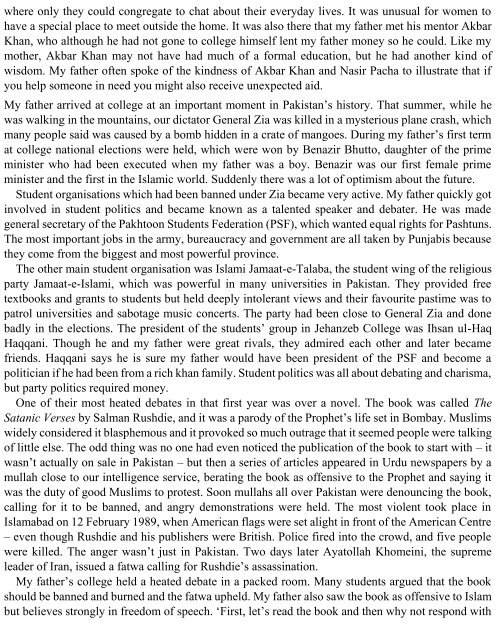Create successful ePaper yourself
Turn your PDF publications into a flip-book with our unique Google optimized e-Paper software.
where only they could congregate to chat about their everyday lives. It was unusual for women to<br />
have a special place to meet outside the home. It was also there that my father met his mentor Akbar<br />
Khan, who although he had not gone to college himself lent my father money so he could. Like my<br />
mother, Akbar Khan may not have had much of a formal education, but he had another kind of<br />
wisdom. My father often spoke of the kindness of Akbar Khan and Nasir Pacha to illustrate that if<br />
you help someone in need you might also receive unexpected aid.<br />
My father arrived at college at an important moment in Pakistan’s history. That summer, while he<br />
was walking in the mountains, our dictator General Zia was killed in a mysterious plane crash, which<br />
many people said was caused <strong>by</strong> a bomb hidden in a crate of mangoes. During my father’s first term<br />
at college national elections were held, which were won <strong>by</strong> Benazir Bhutto, daughter of the prime<br />
minister who had been executed when my father was a boy. Benazir was our first female prime<br />
minister and the first in the Isl<strong>am</strong>ic world. Suddenly there was a lot of optimism about the future.<br />
Student organisations which had been banned under Zia bec<strong>am</strong>e very active. My father quickly got<br />
involved in student politics and bec<strong>am</strong>e known as a talented speaker and debater. He was made<br />
general secretary of the Pakhtoon Students Federation (PSF), which wanted equal rights for Pashtuns.<br />
The most important jobs in the army, bureaucracy and government are all taken <strong>by</strong> Punjabis because<br />
they come from the biggest and most powerful province.<br />
The other main student organisation was Isl<strong>am</strong>i J<strong>am</strong>aat-e-Talaba, the student wing of the religious<br />
party J<strong>am</strong>aat-e-Isl<strong>am</strong>i, which was powerful in many universities in Pakistan. They provided free<br />
text<strong>book</strong>s and grants to students but held deeply intolerant views and their favourite pastime was to<br />
patrol universities and sabotage music concerts. The party had been close to General Zia and done<br />
badly in the elections. The president of the students’ group in Jehanzeb College was Ihsan ul-Haq<br />
Haqqani. Though he and my father were great rivals, they admired each other and later bec<strong>am</strong>e<br />
friends. Haqqani says he is sure my father would have been president of the PSF and become a<br />
politician if he had been from a rich khan f<strong>am</strong>ily. Student politics was all about debating and charisma,<br />
but party politics required money.<br />
One of their most heated debates in that first year was over a novel. The <strong>book</strong> was called The<br />
Satanic Verses <strong>by</strong> Salman Rushdie, and it was a parody of the Prophet’s life set in Bombay. Muslims<br />
widely considered it blasphemous and it provoked so much outrage that it seemed people were talking<br />
of little else. The odd thing was no one had even noticed the publication of the <strong>book</strong> to start with – it<br />
wasn’t actually on sale in Pakistan – but then a series of articles appeared in Urdu newspapers <strong>by</strong> a<br />
mullah close to our intelligence service, berating the <strong>book</strong> as offensive to the Prophet and saying it<br />
was the duty of good Muslims to protest. Soon mullahs all over Pakistan were denouncing the <strong>book</strong>,<br />
calling for it to be banned, and angry demonstrations were held. The most violent took place in<br />
Isl<strong>am</strong>abad on 12 February 1989, when American flags were set alight in front of the American Centre<br />
– even though Rushdie and his publishers were British. Police fired into the crowd, and five people<br />
were killed. The anger wasn’t just in Pakistan. Two days later Ayatollah Khomeini, the supreme<br />
leader of Iran, issued a fatwa calling for Rushdie’s assassination.<br />
My father’s college held a heated debate in a packed room. Many students argued that the <strong>book</strong><br />
should be banned and burned and the fatwa upheld. My father also saw the <strong>book</strong> as offensive to Isl<strong>am</strong><br />
but believes strongly in freedom of speech. ‘First, let’s read the <strong>book</strong> and then why not respond with




